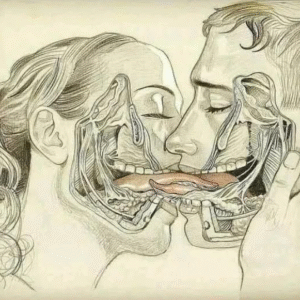Tongue Kissing: More Than Just a Romantic Gesture
Tongue kissing, often referred to as “French kissing,” is one of the most intimate and passionate forms of human affection. While at first glance it may seem like a simple act of closeness, the process involves a complex interplay of biology, psychology, and social bonding mechanisms. From the exchange of sensory signals to the release of chemicals that affect our emotions, tongue kissing is an intricate behavior that reflects both our evolutionary heritage and our personal connections.
1. The Physiology of Tongue Kissing
When two people engage in tongue kissing, the body responds in numerous physical ways:
-
Activation of Nerve Endings
The lips are among the most sensitive parts of the human body, packed with a high concentration of nerve endings. When these come into contact with another person’s lips and tongue, the nerves send a barrage of sensory signals to the brain. The tongue, while less sensitive than lips, also contributes to the tactile experience, enhancing the intensity of stimulation. This is why the act of kissing often feels so pleasurable and can even cause goosebumps or a racing heartbeat. -
Increase in Heart Rate and Blood Flow
Kissing elevates heart rate and dilates blood vessels, increasing blood flow throughout the body. This physiological response is similar to mild exercise and can trigger a sense of excitement and arousal. Many people notice flushed skin, especially on the face and chest, during a passionate kiss. -
Release of Chemicals: The “Feel-Good” Hormones
Tongue kissing triggers the brain to release a cocktail of neurotransmitters and hormones:
-
Dopamine: Associated with pleasure and reward, it creates feelings of euphoria and excitement.
-
Oxytocin: Often called the “bonding hormone,” oxytocin fosters feelings of closeness, trust, and attachment between partners.
-
Serotonin: While involved in mood regulation, serotonin can contribute to feelings of contentment and reduced stress.
-
Adrenaline: Responsible for the “butterflies” in the stomach and the rush of excitement that can accompany kissing.
-
Muscular Engagement
Tongue kissing is not a passive activity; it involves multiple facial and neck muscles. Movements of the lips, tongue, and jaw engage muscles such as the orbicularis oris and masseter, which can even burn a small number of calories. Though not a substitute for exercise, this muscular activity contributes to the sensation of intimacy and shared effort in the act.
2. The Psychological Impact
Tongue kissing is not just physical; it has profound psychological effects.
-
Emotional Connection
The intimacy of sharing saliva and tongue movements creates a unique sense of closeness. Many psychologists believe that tongue kissing serves as a form of nonverbal communication, allowing partners to gauge attraction, emotional readiness, and compatibility. -
Stress Reduction
The release of oxytocin and dopamine during kissing can lower cortisol levels, reducing stress and anxiety. A passionate kiss can act as a temporary escape from tension, providing a moment of shared pleasure and relaxation. -
Reinforcement of Romantic Bonds
Frequent tongue kissing is often associated with stronger relationship satisfaction. Studies have shown that couples who kiss more often report higher levels of intimacy and commitment. The act serves as a reinforcement mechanism for romantic attachment, encouraging long-term pair bonding.
3. Evolutionary Perspective
From an evolutionary standpoint, tongue kissing may have developed as a way to assess genetic compatibility. The exchange of pheromones and chemical signals through saliva allows individuals to subconsciously evaluate a partner’s immune system compatibility, which could enhance reproductive success. In this sense, kissing is not just about pleasure but also about survival and the selection of a healthy mate.
4. Social and Cultural Dimensions
Tongue kissing is practiced differently across cultures, and social norms can influence both the frequency and style of the act:
-
Cultural Variations
In Western cultures, French kissing is often associated with romantic love and sexual attraction. In some other societies, public displays of tongue kissing may be frowned upon or considered taboo. Cultural upbringing can therefore shape how individuals perceive and engage in this form of intimacy. -
Nonverbal Communication
Tongue kissing conveys messages without words. The intensity, duration, and style of a kiss can signal desire, affection, or even reassurance. Couples often develop a “language of kissing,” using subtle cues to communicate emotions and intentions.
5. Health Considerations
While tongue kissing is largely beneficial for bonding and pleasure, there are some health considerations to be aware of:
-
Transmission of Germs
Kissing can transmit viruses and bacteria, including the common cold, influenza, or herpes simplex virus. Maintaining good oral hygiene and being aware of your partner’s health status can minimize risks. -
Immune System Benefits
On the positive side, kissing exposes partners to each other’s microbiota, potentially boosting immune system diversity and resistance to pathogens. Small-scale studies suggest that couples who kiss regularly may develop stronger immune defenses due to this exchange.
6. The Role of Anticipation and Context
The context of a kiss greatly affects its impact. Anticipation, emotional readiness, and trust can heighten the pleasure and emotional significance of tongue kissing. A spontaneous, passionate kiss may trigger stronger dopamine and adrenaline responses, while a kiss in a safe, familiar setting may promote oxytocin release and bonding.
7. Fun Facts About Tongue Kissing
-
The average tongue kiss lasts between 12–14 seconds, though passionate kisses can last much longer.
-
People tend to mirror their partner’s kissing style unconsciously, which fosters synchronization and intimacy.
-
Studies suggest that women often initiate kissing more than men in romantic relationships, using it as a test of compatibility and interest.
Conclusion
Tongue kissing is far more than a simple display of affection. It is a multifaceted behavior that engages the body, mind, and emotions. Through nerve stimulation, hormonal releases, and muscular activity, kissing provides pleasure, reduces stress, and strengthens bonds. Psychologically, it serves as a form of communication, emotional reassurance, and compatibility testing. From an evolutionary perspective, it helps assess genetic fitness, while socially and culturally, it conveys meaning, love, and desire.
Understanding the science behind tongue kissing highlights why this intimate act holds such universal appeal. It is a dance of biology and emotion, a ritual that has endured across human history, and a reminder that some of the simplest gestures—like a kiss—can have profound effects on our hearts and minds.
If you want, I can also create a step-by-step guide on what scientifically happens in the brain and body second by second during a tongue kiss, which would make the topic even more detailed and fascinating.
Do you want me to do that?


